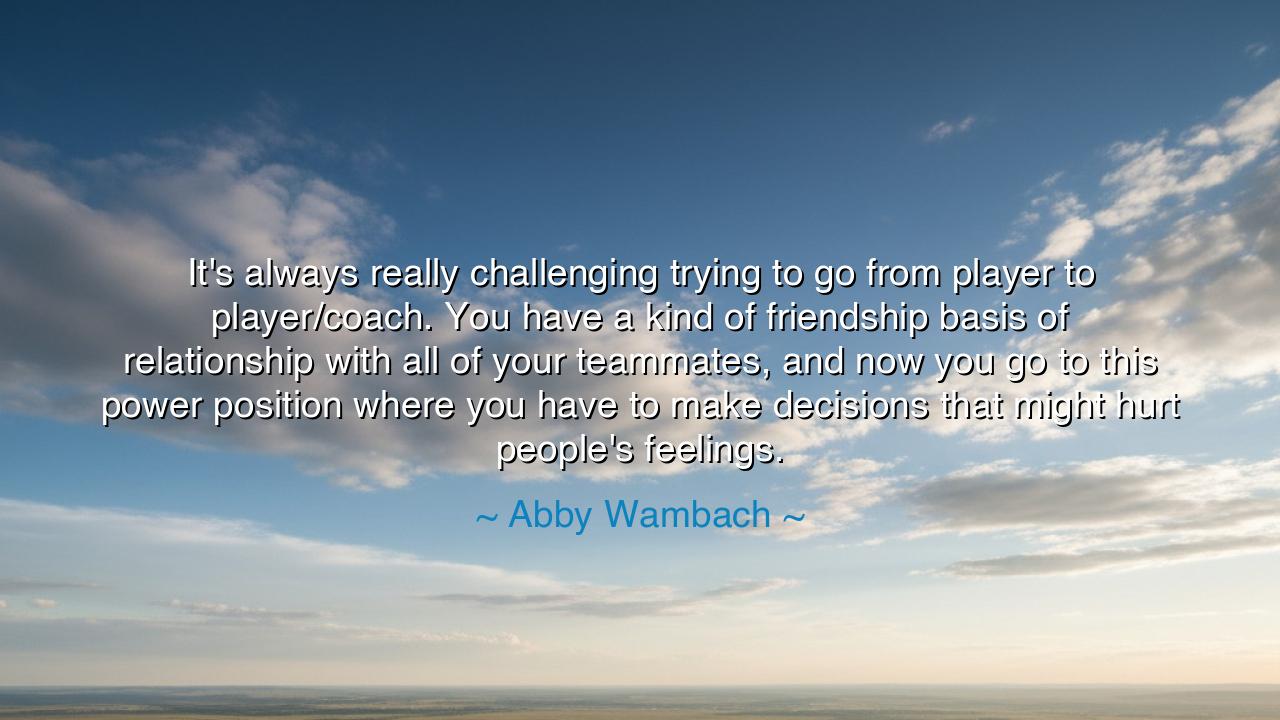
It's always really challenging trying to go from player to
It's always really challenging trying to go from player to player/coach. You have a kind of friendship basis of relationship with all of your teammates, and now you go to this power position where you have to make decisions that might hurt people's feelings.






In her words, Abby Wambach, warrior of the field and leader of hearts, reveals the quiet battle that lies beyond victory: “It’s always really challenging trying to go from player to player/coach. You have a kind of friendship basis of relationship with all of your teammates, and now you go to this power position where you have to make decisions that might hurt people’s feelings.” These words speak not only of sport, but of the eternal tension between friendship and authority, between compassion and responsibility. It is the struggle of one who must lead those she once walked beside — who must exchange equality for stewardship, and camaraderie for command.
The origin of this quote arises from Wambach’s own journey as one of the most respected figures in women’s soccer — a champion whose leadership carried the U.S. Women’s National Team to glory. As her career evolved, she moved from player to mentor and strategist, a transition that tested not her strength, but her empathy. The field that once echoed with shared laughter and trust now demanded decisions, boundaries, and judgment. She speaks from the heart of that transformation — of the sorrow that comes when friendship must yield to duty, when love of the team must surpass love of the individual. It is a pain known to every leader who has risen from among their peers.
In her reflection, Wambach captures an ancient truth: to lead is to serve, but also to separate. The player and the friend act from closeness; the coach must act from vision. And yet, both roles are born from love — one the love of companionship, the other the love of purpose. The difficulty lies in learning to hold both without breaking either. Just as the warrior-king must still remember his soldier’s heart, so must the new leader remember the laughter and trust that once bound the circle of equals. For authority, without humility, turns cold — and friendship, without boundaries, loses direction.
History offers us many reflections of this same trial. Consider Julius Caesar, who rose from soldier to general among men who had once been his comrades-in-arms. His strength won their loyalty, but his ascent tested their hearts. Those who once dined beside him now saluted him as “Imperator.” Some rejoiced in his rise, others turned against him, feeling betrayed by the distance that leadership demanded. So too does Wambach’s insight echo the lesson of history — that power reshapes relationships, and that the truest leader is one who bears that burden with compassion, knowing that every choice carries both consequence and cost.
There is a certain loneliness in leadership, a silence that follows even the most triumphant moment. The player shares joy freely; the coach must carry the weight of every decision. To tell a friend she will not start, to push a teammate harder than comfort allows, to guide when others wish to rest — these are acts not of cruelty, but of courage. Wambach’s words remind us that the highest form of friendship is not always kindness, but truth given with love. To lead means to hurt sometimes, not because one wishes to, but because growth requires discipline, and victory demands sacrifice.
Yet within this challenge lies profound beauty. When friendship evolves into leadership, it does not die — it deepens. What was once simple affection becomes a bond strengthened by respect. The true leader is the friend who dares to care enough to make hard choices. In this way, Wambach’s reflection becomes not a lament, but a celebration — a testament to the maturity of love that transforms camaraderie into guidance, and equality into shared purpose. Leadership, she teaches, is not a betrayal of friendship, but its ultimate expression — the willingness to protect others, even from their own comfort.
The lesson, then, is timeless: to lead well, one must love deeply — but not blindly. In practical action, this means holding others accountable without cruelty, standing firm in decision without losing compassion, and remembering always the humanity behind the role. For whether on the field, in the home, or in the halls of power, there will come a moment when every person must rise from among their peers to lead them. When that day comes, remember Wambach’s wisdom — to balance authority with empathy, to act not from pride but from care. For leadership is not a crown to be worn; it is a flame to be carried — bright enough to light the path for others, yet gentle enough not to burn those who walk beside you.






AAdministratorAdministrator
Welcome, honored guests. Please leave a comment, we will respond soon